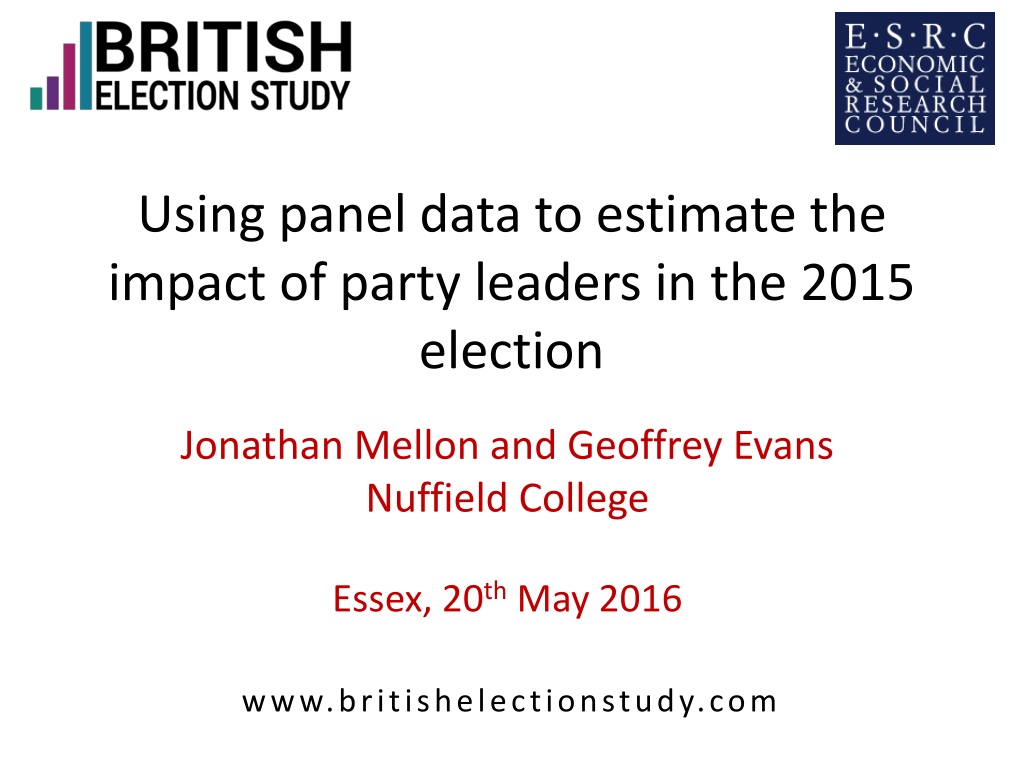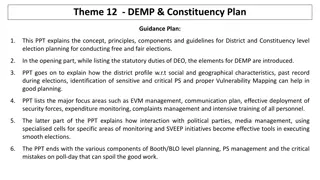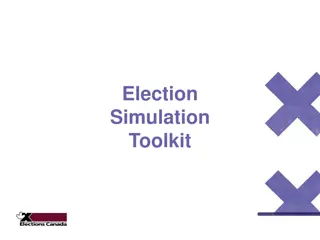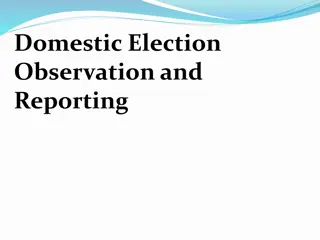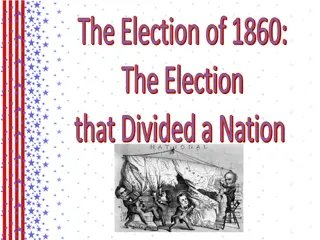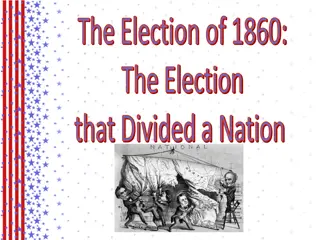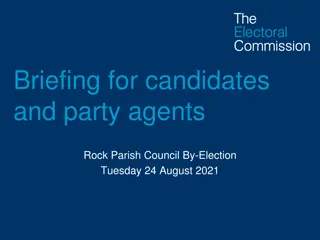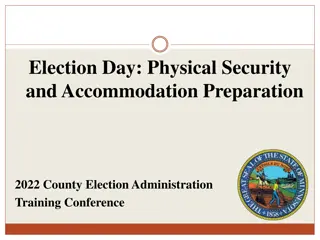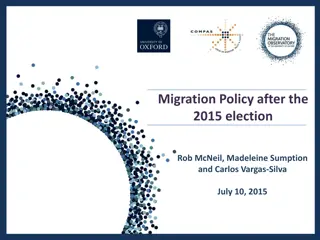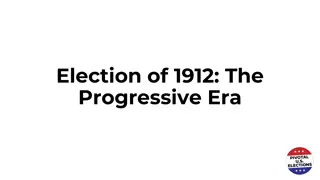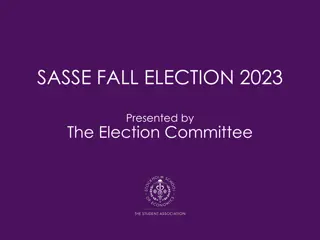Understanding the Impact of Party Leaders in the 2015 Election
Examining the significance of party leaders in the 2015 election through panel data analysis reveals the complexities of leadership evaluations. The study delves into the stability of voters' leader evaluations, challenges in modeling leadership effects, and the need for nuanced measurement methods to gauge leadership impact more accurately.
Uploaded on Oct 09, 2024 | 0 Views
Download Presentation

Please find below an Image/Link to download the presentation.
The content on the website is provided AS IS for your information and personal use only. It may not be sold, licensed, or shared on other websites without obtaining consent from the author. Download presentation by click this link. If you encounter any issues during the download, it is possible that the publisher has removed the file from their server.
E N D
Presentation Transcript
Using panel data to estimate the impact of party leaders in the 2015 election Jonathan Mellon and Geoffrey Evans Nuffield College Essex, 20thMay 2016 www.britishelectionstudy.com
Why focus on leaders? A key element of campaign coverage The personalisation of politics Most visible symbol of a party Very common belief that choosing the right leader is the key to a party s success or failure Some academic scepticism about the importance of leaders: Party support influences judgements Leaders proxy for policy and party performance Big question is how to measure a clean effect
Averages can be misleading Journalists regularly discuss the importance of leaders Typically on the basis of percentage approval ratings Academic studies have also tended to look cross- sectionally (Aarts, Blais and Schmitt, 2011) But... A leader can have stable or even falling ratings while still helping their party A leader that helpings their party keep existing voters may not help gain votes
The evidence base Waves 1 6 of the BES panel survey, February 2014 May/ June2015, N=c.22,000 respondents* How much do you like or dislike each of the following party leaders? (response: 0 10 scale) Thinking overall about how the party leaders are performing during the election campaign, which party leader do you think is performing best so far? (response: choose one) *excluding Scotland
The remarkable stability of voters leader evaluations Leader like correlations W4 to W6 W1 to W6 Leader W1 to W4 0.88 Cameron 0.85 0.83 0.81 Miliband 0.80 0.75 0.73 Clegg 0.73 0.65 0.82 Farage 0.71 0.68
Challenges in modelling leadership Leaders may have different effects on recruitment to retention Estimate switching to and switching from separately Endogeneity of leadership evaluations to party choice Looking at party switching rather than cross-sectionally Looking at changes in leadership evaluations Test the robustness of our leadership estimates to the inclusion of many other (also possibly endogenous) controls Estimating the effect of vote at t1 on vote at t2 Run a separate model for each group of voters at t1
Our approach Effects of changes in approval ratings on changes in party choice: recruitment (do they attract support from other parties?) retention (do they retain their own?) maximal (no controls) & minimal (with controls) net effects
How we estimate effects. Separately model each flow from origin to destination (without/with controls) Counter-factual probabilities of switching holding leader constant compared to actual probabilities = estimate of per cent effect Same procedure applied to a leader s destination party to estimate recruitment effects Net effect = recruit/retained divided by initial share of vote Example: model of wave 4 choices for Conservative wave 1 voters: Cameron s effects = retention , other leaders are pull
Model specification McFadden choice models that allow coefficients to be shared across contrasts or only included for certain contrasts log A separate model is run for each set of voters at t1
Example of a change-on-change model: Conservative origins (McFadden choice models) w4-w6 coefficients Labour Lib Dem UKIP Other Don't know Miliband (W4-W6 change) 0.30** Farage (W4-W6 change) 0.26*** Clegg (W4-W6 change) 0.00 Conservative best on MII (W4-W6 change) -1.27** -1.17*** -1.21*** -1.51* -1.03* Party ID strength (W4-W6 change) -0.12 0.42* 0.29 -0.03 -0.87 Cameron (W4-W6 change) -0.63*** -0.12 -0.34*** -0.17 -0.41 Party ID Conservatives (W4-W6 change) -0.5 -0.32 -0.06 -1.25 -0.19 Constant -3.26*** -2.36*** -2.86*** -3.76* -5.66*** Parameters are logistic regression coefficients, the base category is Conservative * p<0.05, ** p<0.01, *** p<0.001 Alternative specific predictor for Most important issue in wave 4 not shown
The questions: Who helped their party win votes? By pulling in recruits By retaining supporters Over the long pre-campaign (February 14- to March 15) Over the formal campaign? Over the whole period (February 14-May 15)
Voter retention over the long campaign (between waves 1 and 4)
Voter retention over the formal campaign (between waves 4 and 6)
The campaigns impact on leaders evaluations: nothing happened (3-day moving averages)
Estimated leaders impact: Feb 2014 > election Pull: 19-21% of UKIP gains can be attributed to changes in Farage's ratings 30-31% of Conservative vote gains can be attributed to changes in Cameron's ratings 7-9% of Labour gains can be attributed to changes in Miliband's ratings 19-21% of Lib Dem gains can be attributed to changes in Clegg s ratings Push: 4-5% of Labour losses can be attributed to changes in Miliband's ratings UKIP would have lost 8% more votes if no one had changed their view of Farage. The Conservatives would have lost 11-16% more votes if no one had changed their view of Cameron The Lib Dems would have lost 4-6% more votes if no one had changed their view of Clegg
So how did they fare? Farage: Importance of charismatic leadership for emerging parties UKIP increased their support in 2014 and maintained it in 2015 to a fair degree because of him Support for UKIP is flimsier than the main parties, with many voters switching away from UKIP regardless of Farage s appeal Farage has to continue to out-perform other party leaders David Cameron, qualified good news. Moderately effective in winning votes: A modest asset Nick Clegg not toxic, even seems to have helped towards the end Ed Miliband hindered Labour by not performing the usual role of a party leader bringing in votes
Leaders or party positions? Net effects of leaders controlling for perceived party positions on redistribution & the EU Excluding party positions Including party positions
The remarkable stability of leader evaluations Leader like correlations W4 to W6 W1 to W6 Leader W1 to W4 0.88 Cameron 0.85 0.83 0.81 Miliband 0.80 0.75 0.73 Clegg 0.73 0.65 0.82 Farage 0.71 0.68
Among vote switchers between waves 4 and 6: Those who moved to UKIP had far higher ratings of Farage in Wave 6 than Wave 4. Those who left were only slightly less positive This same pattern held for the Conservatives and Cameron Miliband s ratings dropped moderately among those who left Labour, and increased moderately among those who moved to them Clegg s approval changes were substantial among his (few) recruits but also a small positive change among defectors
The evidence base Waves 1 6 of the BES panel survey, February 2014 May/ June2015, N=c.22,000 respondents* How much do you like or dislike each of the following party leaders? (response: 0 10 scale) Thinking overall about how the party leaders are performing during the election campaign, which party leader do you think is performing best so far? (response: choose one) *Not including Scotland
